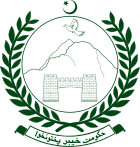Mufti Mahmud
| Maulana Mufti Mehmood Politician, Minister | |
|---|---|
| Chief Minister of Khyber Pakhtunkhwa | |
|
In office 1972–1973 | |
| Preceded by | Sardar Bahadur Khan |
| Succeeded by | Inayatullah Khan Gandapur |
| Secretary General of Jamiat Ulema-e Islam (F) | |
|
In office 1968–1980 | |
| Preceded by | Maulana Abdullah Darkhawasti |
| Personal details | |
| Born |
1919 Kulachi, Abul Khel, Dera Ismail Khan District |
| Died |
1980 (aged 61) Karachi, Sindh |
| Nationality | Pakistani |
| Political party | Jamiat Ulema-e-Islam |
| Other political affiliations | Jamiat Ulema-e-hind (Ex. Member) |
| Children |
Maulana Fazal-ur-Rehman Maulana Lutf ur Rehman Atta-ur-Rehman |
| Occupation | Politician, Scholar, Teacher |
| Part of a series on |
| Deobandi movement |
|---|
| Ideology and influences |
| Founders and key figures |
| Notable institutions |
| Centres (markaz) of Tabligh |
| Associated organizations |
Maulana Mufti Mehmood (Pashto: مولانا مفتى محمود), (1919–1980) was a member of Indian National Congress party, and one of the founding members of the Jamiat Ulema-e-Islam (JUI) in Pakistan.[1]
Early life and career
Born in January 1919, he was an ethnic Marwat Pashtun from Abdul Khel, Dera Ismail Khan District. He received his religious education from Jamia Qasimiya in Moradabad, India. In 1941, he worked as a teacher in Isakhel, Mianwali. He was a militant activist of the Indian National Congress, participating in the Indian Independence Movement in the 1940s. He opposed the idea of partition and campaigned against the Muslim League.[1]
In Pakistan
He worked as a teacher in Madrassa Qasim-ul-Uloom in Multan, Punjab in 1950. Later in his career, he held positions of Chief Mudarras in charge of Education, Chief Mufti, Sheikh-ul-Hadith and Muhtamim. He issued at least 25,000 Fatawa in his lifetime.[1] He opposed President Ayub Khan's 'One Unit Scheme'. Mufti Mahmud participated in the elections for the National Assembly for the first time under Ayub Khan's 'Basic Democracy Program' and defeated all his opponents in 1962.[1]
- On 8 January 1968, in Dacca, then in East Pakistan, Mufti Mahmud was one of the key leaders of Jamhoori Majlis-e-Amal that opposed Ayub Khan's regime.
- In the 1970 General Elections, Mufti Mahmud had a landslide victory against Zulfiqar Ali Bhutto in the Dera Ismail Khan constituency.[1]
After the 1970 General Elections in Pakistan, he became the president of Jamiat Ulema-e-Islam founded by Shabir Ahmed Usmani. His party went into a coalition with the National Awami Party & Pakistan Peoples Party for the 1970 General Elections. In the 1970s, Jamiat Ulema-e-Islam received significant funding from Saudi Arabia.[2]
On 1 March 1972, he was elected as the Chief Minister of the province of Khyber-Pakhtunkhwa during the Zulfiqar Ali Bhutto regime in Pakistan. He, along with his cabinet, resigned in protest at the dismissal of the NAP - JUI (F) coalition government in Balochistan on 14 February 1973.[1]
- During his tenure as Chief Minister, he introduced many reforms:
- Forbidding use of alcohol, announcing Urdu as the official language in Government offices, ban on interest in financial transactions and declared Friday as the official holiday in his province.[1]
- Mufti Mahmud played a vital role in Tehreek-e-Khatme Nabuwwat, a religious movement which has persecuted followers of Mirza Ghulam Ahmad in Pakistan. He led a team of Islamic scholars which worked for the declaration of Ahmadis as non-Muslims in 1974.
- He supported Afghan-Jihad against USSR in 1979 (see also Soviet-Afghan War).
Death and legacy
He died on 14 October 1980 in Karachi, Sindh. He was buried in his hometown Abdul Khel, Paniala, Dera Ismail Khan District. His son Maulana Fazal-ur-Rehman is a notable politician now and heads the Jamiat Ulema-e-Islam (JUI) party in Pakistan.[3]
Publications
Books by him
- Tafsīr-i Maḥmūd, translation of and commentary on the Qur'an, in 3 volumes
- Fatāvʹa Muftī Maḥmūd, his fatwas, in 11 volumes
- Az̲ān-i saḥar : Maulānā Muftī Maḥmūd ke inṭerviyuz aur taqārīr kā majmūʻah, collected speeches and interviews
- K̲h̲ut̤bāt-i Maḥmūd : majmūʻah-yi taqārīr-i mufakkir-i Islām, Maulānā Muftī Maḥmūd, collection of his speeches
Books about him
- Savāniḥ-i ḥayāt: Muftī Maḥmūd, vazīr-i aʻlá-yi Sarḥad, janral sekraṭrī Jamʻiyat-i ʻUlamāʼ-yi Islām, Pākistān by Z̈iyāʼurraḥmān Fārūqī, 1972
- Muftī Maḥmūd kī siyāsat by Nūrulḥaq Quraishī, 1974
- Maulānā Mufti Mahmūd by Naʻim Āsī, 1977
- Maulānā Muftī Maḥmūd ... kī siyāsī zindagī by Gul Nāyāb K̲h̲ān Citrālī, 2002
- Mufakkir-i Islām, qāʼid-i Islāmī inqilāb Maulānā Muftī Maḥmūd ... ek darvesh siyāsatdān by Sayyid Anvar Qidvāʼī, 2003
- Savāniḥ qāʼid-i millat Ḥaẓrat Maulānā Muftī Maḥmūd by ʻAbdulqayyūm Ḥaqqānī, 2003
- Muftī Maḥmūd kā daur-i ḥukūmat by Ashfāq Hāshmī, 2004
- Maulānā Muftī Maḥmūd ke ḥairat angez vāqiʻāt by Momin K̲h̲ān ʻUs̲mānī, 2009
- Muftī-yi Aʻẓam Maulānā Muftī Maḥmūd kī ʻilmī, dīnī aur siyāsī k̲h̲idmāt by ʻAbdulḥakīm Akbarī, 2010
- Afkār-i Maḥmūd : Shaik̲h̲ulhind Maulānā Maḥmūd Ḥasan va mufakkir-i Islām Maulānā Muftī Maḥmūd kī ḥayāt o k̲h̲idmāt kā ḥasīn tazkirah by Muḥammad Fārūq Quraishī, 2017
See also
References
- 1 2 3 4 5 6 7 http://storyofpakistan.com/mufti-mehmood#prettyPhoto, Profile of Mufti Mahmud on storyofpakistan.com website, Updated 5 Jan 2009, Retrieved 23 Jan 2017
- ↑ Halverson, Jeffry R. (2010). Theology and Creed in Sunni Islam: The Muslim Brotherhood, Ash'arism, and Political Sunnism. Palgrave Macmillan. p. 118. ISBN 9781137473578.
By the 1970s, the JUI, under the leadership of Mawlana Mufti Mahmud (d. 1980) was a chief recipient of the aforementioned Wahhabite-Athari support from the Gulf monarchies, chiefly Saudi Arabia.
- ↑ http://tribune.com.pk/story/792378/in-defence-of-taliban-fazls-remarks-spark-furore-in-afghanistan/, The Express Tribune newspaper, Published 17 November 2014, Retrieved 23 January 2017
External links
| Political offices | ||
|---|---|---|
| Preceded by Sardar Bahadur Khan |
Chief Minister of Khyber-Pakhtunkhwa 1972 – 1973 |
Succeeded by Inayatullah Gandapur |
| Party political offices | ||
| Preceded by Maulana Abdullah Darkhawasti |
Ameer of Jamiat Ulema-e-Islam 1968 – 1980 |
Succeeded by Maulana Fazal-ur-Rehman |

